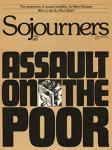The National Association of Evangelicals' (NAE) Director of Public Affairs, Robert Dugan, Jr., testified before the Senate Foreign Relations Committee in late May in enthusiastic support of Dr. Ernest Lefever.
Lefever, the highly controversial nominee for the post of Assistant Secretary of State for Human Rights and Humanitarian Affairs, withdrew his name from consideration on June 5.
Although he claimed to care for "every sparrow that falls," in recent years Lefever pushed to abolish all U.S. foreign policy legislation on human rights. (In May he expediently flip-flopped on this and said he had "goofed.") He believes the U.S. "has no responsibility--and certainly no authority--to promote human rights in other sovereign states," except in communist nations. He refused under persistent questioning by Republican senators to name any countries other than communist ones that violate human rights. Last year, he lobbied Congress to allow the CIA to use, and even pay, Christian missionaries to spy for the U.S. in foreign countries (NAE's Dugan did say many evangelicals would disagree with him on this). Among other things, Lefever has dismissed religious and other human rights activists in south Korea as "a mixture of naive Utopians and power hungry ideologues," and has opposed one-person, one-vote elections in Rhodesia and South Africa.
NAE's Dugan, in taking what he called the "unusual" action of endorsing Lefever, said he spoke for himself and not NAE officially, since NAE had not had time to take up the matter as an organization. Nonetheless, Dugan said he believed his "views reflect those of most evangelicals in the U.S."
The idea to take the unprecedented action of supporting Lefever's nomination, said Dugan, had come up in conversation with Dr. Carl F.H. Henry, noted evangelical scholar and writer, and with a few others of influence among mainstream evangelicals. Henry, a longtime friend of Lefever, is on the board of the ex-nominee's think tank, the Ethics and Public Policy Center.
Dugan's testimony, like that of Lefever and his supporters, contained confusing contradictions. On the one hand, Dugan said he and "most evangelicals" believe human rights are "universal," that they "flow...from the conviction that humanity was created in the image of God"; and that Scripture calls evangelicals "to pray, speak, and act on behalf of persons whose rights are violated by abusive regimes, whether on the Right or Left."
But Dugan went on to "applaud" Lefever's view that human rights violations in "totalitarian" regimes "ought to be criticized above all others." (In Reagan administration usage, totalitarian means communist and authoritarian means right-wing dictatorship.) Dugan said Lefever's "quiet diplomacy" style with friendly dictatorships but "public preaching" against the USSR is "refreshing." Dugan claimed many evangelicals agree with Lefever that human rights principles sometimes must be overridden by other concerns, necessitating "political toleration of certain evils."
Echoing this America-first and human-rights-second philosophy in explaining his own support for Lefever, Dr. Henry criticized placing human rights "over and above other issues that are equal imperatives, that is, national security and the economic integrity of the nation," a point where he said the Carter administration failed.
While human rights are important before God, and violations anywhere "are unfortunate," said Henry, "glaring public exposure" initially "ought to be made against totalitarian powers" who "in principle suspend human rights," rather than against right-wing authoritarian regimes where they are "compromised as a temporary, dictatorial quirk." Left unsaid was an explanation of the difference, before God, of the torture of a Jacobo Timerman in right-wing Argentina and that of an Anatoly Shcharansky in the Soviet Union.
Lefever's personal honesty and integrity were sharply questioned by senators who got him to admit that his Ethics and Public Policy Center had accepted $25,000 from the Nestle Corporation, $10,000 from Nestle's U.S. lobbyist, and $12,500 from two U.S. baby food manufacturers. As the money came in, the center studied the infant formula marketing controversy and reprinted and widely distributed the resulting article that defended Nestle and called Nestle's religious critics "Marxists marching under the banner of Christ."
At first, the evasive Lefever combatively maintained that the study was undertaken and the author chosen in October, 1979, "without any contact, any financial contact, with Nestle." But later, in closed session and under sharp questioning from his increasingly stunned senatorial supporters, Lefever contradicted his story and admitted he had met with Nestle representatives in September, 1979, asking for a contribution and discussing the possibility of a study at the same time. With that, he lost crucial support among the few remaining backers he had among the Republican majority. The final vote was 13 to four against Lefever, with five of the committee's majority of nine Republicans opposing him.
When asked before the closed session revelations, Henry and Dugan both denied any knowledge of wrongdoing on Lefever's part. "When a guy looks you in the eye and says we didn't, this was not tainted, you want to believe that," said Dugan. "And if you find out later you were betrayed, it goes down hard."
In a telephone interview in January, Sojourners asked Lefever if the sparse information on his Nestle fiasco at that time did not raise legitimate suspicion. "Not at all," Lefever replied. "Only people with dirty minds" would suspect any wrongdoing.
Phil M. Shenk was on the editorial staff at Sojourners when this article appeared.

Got something to say about what you're reading? We value your feedback!
